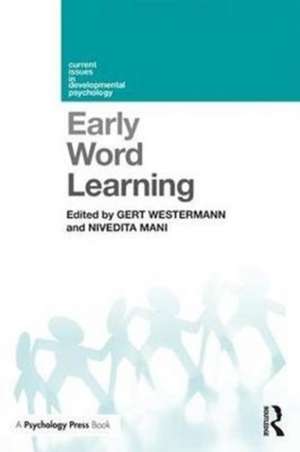Early Word Learning: Current Issues in Developmental Psychology
Editat de Gert Westermann, Nivedita Manien Limba Engleză Paperback – 10 noi 2017
Experts in the field review the development of early lexical acquisition from empirical, computational and theoretical perspectives to examine the development of skilled word learning as the outcome of a process that begins even before birth and spans the first two years of life. Drawing on cutting-edge research in infant eye-tracking, neuroimaging techniques and computational modelling, this book surveys the field covering both established results and the most recent advances in word learning research.
Featuring chapters from international experts whose research approaches the topic from these diverse perspectives using different methodologies, this book provides a comprehensive yet coherent and unified representation of early word learning. It will be invaluable for both undergraduate and postgraduate courses in early language development as well as being of interest to researchers interested in lexical development.
| Toate formatele și edițiile | Preț | Express |
|---|---|---|
| Paperback (1) | 256.76 lei 6-8 săpt. | |
| Taylor & Francis – 10 noi 2017 | 256.76 lei 6-8 săpt. | |
| Hardback (1) | 760.74 lei 6-8 săpt. | |
| Taylor & Francis – 17 noi 2017 | 760.74 lei 6-8 săpt. |
Preț: 256.76 lei
Preț vechi: 309.74 lei
-17% Nou
Puncte Express: 385
Preț estimativ în valută:
49.14€ • 50.99$ • 41.07£
49.14€ • 50.99$ • 41.07£
Carte tipărită la comandă
Livrare economică 18 martie-01 aprilie
Preluare comenzi: 021 569.72.76
Specificații
ISBN-13: 9781138843523
ISBN-10: 1138843520
Pagini: 176
Ilustrații: 12
Dimensiuni: 156 x 234 x 11 mm
Greutate: 0.29 kg
Ediția:1
Editura: Taylor & Francis
Colecția Routledge
Seria Current Issues in Developmental Psychology
Locul publicării:Oxford, United Kingdom
ISBN-10: 1138843520
Pagini: 176
Ilustrații: 12
Dimensiuni: 156 x 234 x 11 mm
Greutate: 0.29 kg
Ediția:1
Editura: Taylor & Francis
Colecția Routledge
Seria Current Issues in Developmental Psychology
Locul publicării:Oxford, United Kingdom
Cuprins
Preface, 1. Before the word: Acquiring a phoneme inventory, Titia Benders and Nicole Altvater-Mackensen, 2.The proto-lexicon: Segmenting word-like units from the speech stream, Caroline Junge, 3.Intrinsic and extrinsic cues to word learning, Padraic Monaghan, Marina Kalashnikova, and Karen Mattock, 4. Mapping words to objects, Jessica S. Horst, 5. Building a lexical network, Nivedita Mani and Arielle Borovsky, 6. Verbs: Learning how speakers use words to refer to actions, Jane B. Childers, Angeline Bottera, and Tyler Howard, 7. Listening to (and listening through) variability during word learning, Katherine White, 8. Individual differences in early word learning, Meredith L. Rowe and Kathryn A. Leech, 9. Early bilingual word learning, Christopher Fennell and Casey Lew-Williams, 10. ERP indices of word learning: What do they reflect and what do they tell us about the neural representations of early words?, Manuela Friedrich, 11. Computational models of word learning, Gert Westermann and Katherine Twomey
Notă biografică
Gert Westermann is Professor of Psychology at Lancaster University. He is the Director of the Leverhulme Doctoral Scholarship Programme in Interdisciplinary Research on Infant Development and currently holds a British Academy/Leverhulme Trust Senior Research Fellowship.
Nivedita Mani is Professor of Psychology at Georg-August-Universität Göttingen in Germany. In 2014 she won the Fritz-Behrens Stiftung’s Science Prize and became a Member of Göttingen Academy of Sciences and Humanities in 2017.
Nivedita Mani is Professor of Psychology at Georg-August-Universität Göttingen in Germany. In 2014 she won the Fritz-Behrens Stiftung’s Science Prize and became a Member of Göttingen Academy of Sciences and Humanities in 2017.
Descriere
Early Word Learning explores the processes leading to a young child learning words and their meanings. Word learning is here understood as the outcome of overlapping and interacting processes, starting with an infant’s learning of native speech sounds to segmenting proto-words from fluent speech, mapping individual words to meanings in the face of natural variability and uncertainty, and developing a structured mental lexicon.





